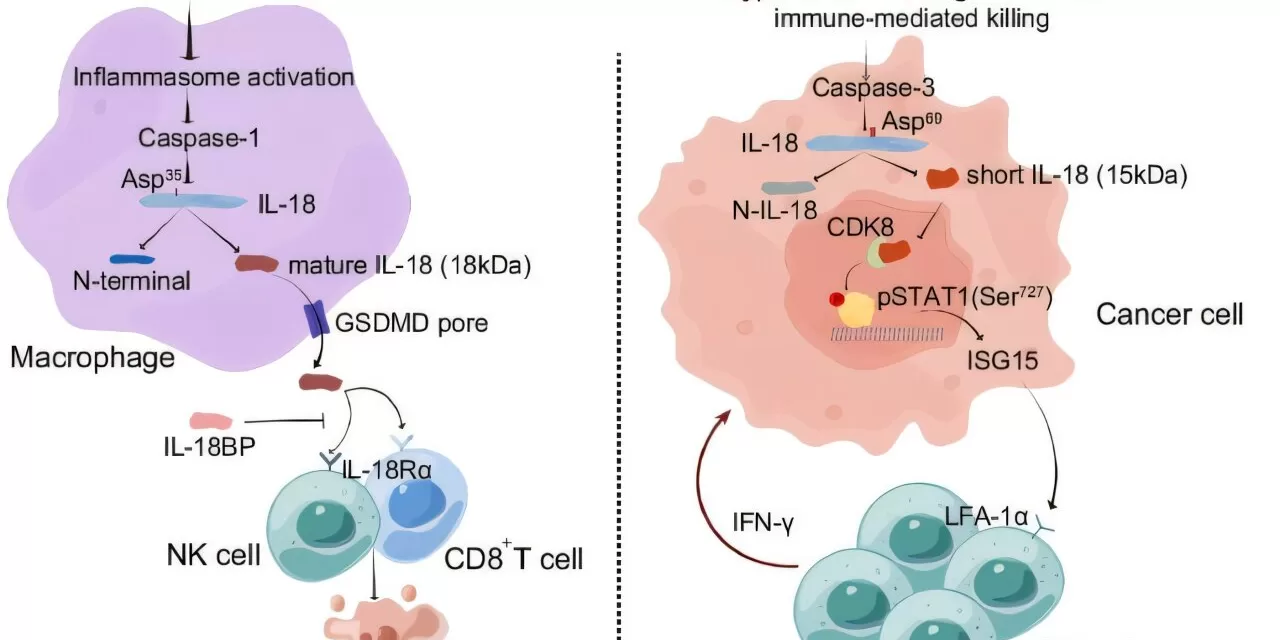Shanghai, China – A groundbreaking study has uncovered a novel mechanism by which a short form of IL-18, a protein produced by tumor cells, activates natural killer (NK) cells to suppress tumor growth. The discovery, published in Nature Immunology, opens new avenues for cancer immunotherapy and provides fresh insight into how tumors interact with the immune system.
The research was conducted by a team of scientists led by Prof. Meng Guangxun from the Shanghai Institute of Immunity and Infection at the Chinese Academy of Sciences and Prof. Liu Chenying from Xinhua Hospital at Shanghai Jiao Tong University School of Medicine.
Overcoming Tumor Evasion Mechanisms
Despite advancements in cancer treatments, response rates for various solid tumors remain suboptimal. Tumors often evade immune system attacks by reducing the expression of key immune modulators such as IL-18. NK cells, known for their rapid response and broad anti-tumor capabilities, have emerged as promising agents in cancer immunotherapy. However, their effectiveness is frequently compromised by the tumor microenvironment.
IL-18, a critical immune-modulating protein, is typically produced as an inactive precursor (pro-IL-18) and requires caspase-1 cleavage to become active. The mature IL-18 then stimulates immune cells through IL-18 receptor signaling. However, this process is often disrupted by a decoy receptor known as IL-18 binding protein (IL-18BP), which neutralizes IL-18’s immune-boosting effects.
Discovery of a New IL-18 Pathway
The study revealed that tumor cells can generate a novel short form of IL-18 through caspase-3 cleavage, bypassing the traditional activation pathway. Unlike mature IL-18, this truncated form does not exit the cell but instead migrates to the nucleus, where it enhances NK cell activity by promoting STAT1 phosphorylation and ISG15 secretion. These processes help NK cells better recognize and attack tumors.
The findings are particularly significant in colorectal cancer, where clinical samples indicate that short IL-18 levels are negatively correlated with tumor progression. This suggests that the protein plays a protective role against tumor growth.
Implications for Cancer Therapy
The discovery challenges previous understandings of IL-18’s role in cancer immunity and suggests potential new therapeutic strategies. According to Prof. Meng, “This finding redefines how IL-18 functions within the tumor microenvironment. By harnessing the power of short IL-18, we may be able to develop targeted immunotherapies that enhance NK cell effectiveness and improve cancer treatment outcomes.”
This research marks an important step in advancing NK cell-based therapies, providing a promising new strategy for tackling solid tumors. Scientists hope that further investigations will lead to clinical applications and novel treatment options.
Disclaimer:
This article is based on current research findings published in Nature Immunology. The information provided is for informational purposes only and should not be considered medical advice. Further studies and clinical trials are necessary to validate these findings before potential therapeutic applications can be realized.












